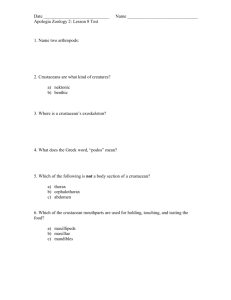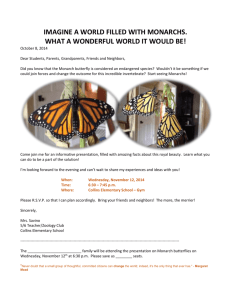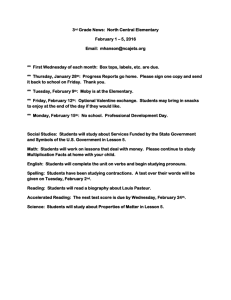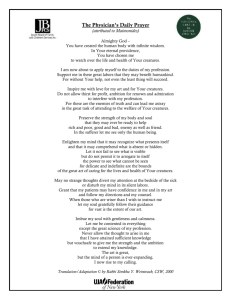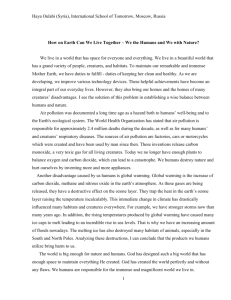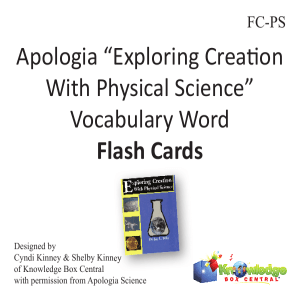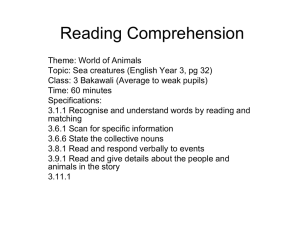File - Ecclesia Classes
advertisement
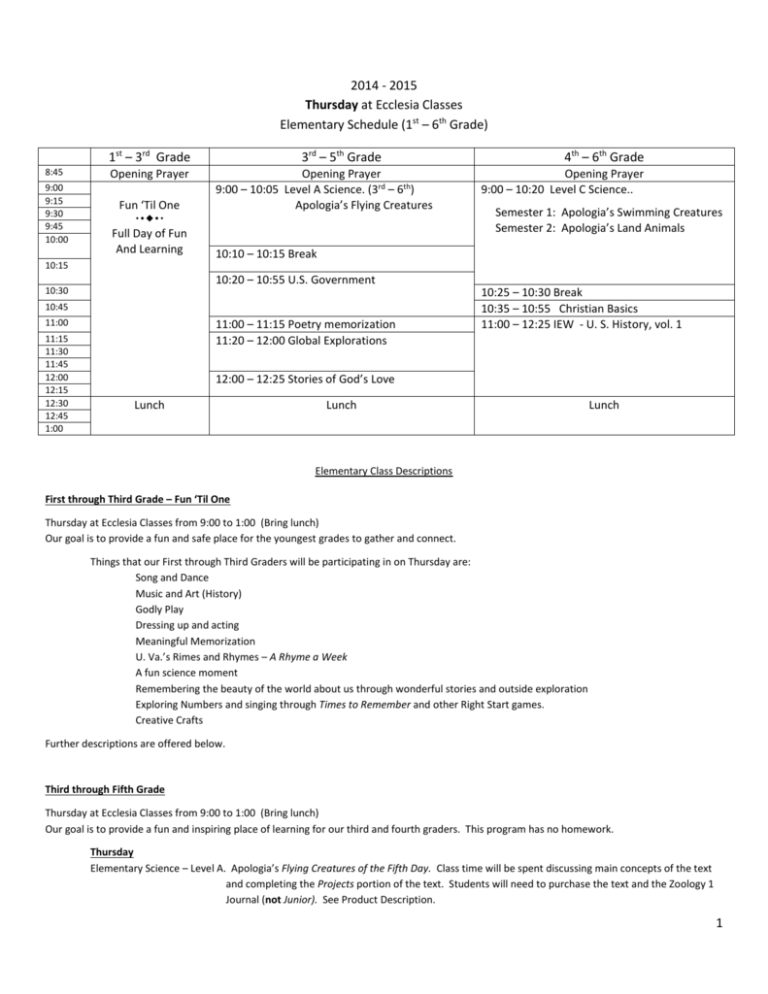
2014 - 2015 Thursday at Ecclesia Classes Elementary Schedule (1st – 6th Grade) 1st – 3rd Grade 8:45 9:00 9:15 9:30 9:45 10:00 Opening Prayer Fun ‘Til One Full Day of Fun And Learning 10:15 3rd – 5th Grade Opening Prayer 9:00 – 10:05 Level A Science. (3rd – 6th) Apologia’s Flying Creatures Opening Prayer 9:00 – 10:20 Level C Science.. Semester 1: Apologia’s Swimming Creatures Semester 2: Apologia’s Land Animals 10:10 – 10:15 Break 10:20 – 10:55 U.S. Government 10:30 10:45 11:00 11:15 11:30 11:45 12:00 12:15 12:30 12:45 1:00 4th – 6th Grade 11:00 – 11:15 Poetry memorization 11:20 – 12:00 Global Explorations 10:25 – 10:30 Break 10:35 – 10:55 Christian Basics 11:00 – 12:25 IEW - U. S. History, vol. 1 12:00 – 12:25 Stories of God’s Love Lunch Lunch Lunch Elementary Class Descriptions First through Third Grade – Fun ‘Til One Thursday at Ecclesia Classes from 9:00 to 1:00 (Bring lunch) Our goal is to provide a fun and safe place for the youngest grades to gather and connect. Things that our First through Third Graders will be participating in on Thursday are: Song and Dance Music and Art (History) Godly Play Dressing up and acting Meaningful Memorization U. Va.’s Rimes and Rhymes – A Rhyme a Week A fun science moment Remembering the beauty of the world about us through wonderful stories and outside exploration Exploring Numbers and singing through Times to Remember and other Right Start games. Creative Crafts Further descriptions are offered below. Third through Fifth Grade Thursday at Ecclesia Classes from 9:00 to 1:00 (Bring lunch) Our goal is to provide a fun and inspiring place of learning for our third and fourth graders. This program has no homework. Thursday Elementary Science – Level A. Apologia’s Flying Creatures of the Fifth Day. Class time will be spent discussing main concepts of the text and completing the Projects portion of the text. Students will need to purchase the text and the Zoology 1 Journal (not Junior). See Product Description. 1 U.S. Government Poetry Memorization Global Explorations Stories of God’s Love This introduction to our government studies the three branches of government: Executive, Legislative and Judicial-including an overview of the agencies and departments of the executive branch, learning the process of how a bill becomes a law; and the hierarchy of the judicial court system. Also, the architecture of many buildings in Washington D.C. will be covered. Students will create a United States Government lapbook. Precisely that. Building vocabulary and a love of language through poetry memorization. We will study a variety of climates and nations: The Amazon Rain Forest, Antarctic, The Sahara Desert, The Great Barrier Reef, The Everglades, and the Nations of Japan, Madagascar, Norway and Peru. Using Perspectives on the World Christian Movement – a Reader, we’ll talk about different people groups around the globe and the story of God’s pursuing love. Fourth through Sixth Grade Thursday Classes - Ecclesia Classes also offers a full Wednesday through Friday (9:00 – 1:00) 4th through 6th grade program. Upper Elementary Science – Level C. First Semester – Apologia’s Zoology 2 (Swimming Creatures). Second Semester is Apologia’s Zoology 3 (Land animals). Students who take this class must love dedicating time to the learning process. They will read 15 – 20 pages on their own each week, as well as respond (in writing) to Narrative Questions. If you have not worked with Apologia before, spend some time looking at samples. The engaging text is written directly to the reader, including many interesting descriptions and clear presentations of the subject matter. Apologia texts are a GREAT way to grow your child as a reader. The text lends itself well to independent learning. See Product Description in the Monday through Friday, 4th – 6th Grade Schedule. Any upper elementary student who wants to move at a slower pace is welcome to take the full year Zoology 1 class. Christian Basics – This is a memorization oriented class that will help students memorize the books of the bible and their authors. We will discuss the family tree of the Israelite Patriarchs and Matriarchs, the lineage of the tribes and why there is no tribe of Joseph. Who are the Levites and how did they acquire their land? And what about those brave daughters of Manasseh that had to remind Joshua not to forget them!!! There will be much fun storytelling and essential church history covered. Additionally, the Lord’s Prayer and the Apostle’s Creed will be memorized and discussed. Your child will develop a well-intentioned framework for all future spiritual study in this multi—aged classroom experience. I.E.W. With Mrs. Golliher – U.S. History, Volume 1. Explorers to Gold Rush – people and events. This weekly class requires that students complete assignments over the remainder of the week. IEW grows students writing skills by supporting strong vocabulary, grammar, and thinking skills as well as developing sophisticated elements of structure and style. Topics in this volume include colonial life, war for independence (Bill of Rights, Boston Tea Party), biographies, the Lewis and Clark expedition, the Oregon Trail, the Trail of Tears, and more. Further Class Descriptions First through Third Grade 1. Rimes and Rhymes -ack: I saw a ship a-sailing -ake: Hiccup, hiccup, go away -ap: Old Mother Twitchett had but one eye -aw: See-saw, two, three, four -ell: Peter, Peter, pumpkin eater -ick: Jack be nimble -ill: Jack and Jill went up the hill -ink: If all the world were paper -oke: There was an owl -ot: Baby and I were baked in a pie 2. -ail/ale: Simple Simon went a-fishing -ain: Flour of England, fruit of Spain -ame: They that wash -an: Ladybug, ladybug, fly away home -at: Jack Sprat could eat no fat -ate: One, two, three, four -ay: Rain, rain, go away -eat: Tom, Tom, the piper’s son -est: Gregory Griggs -ice: An apple pie, when it looks nice -ide: If wishes were horses -ight: Star light, star bright -in: Crosspatch, draw the latch -ine: Elsie Marley is grown so fine -it: There once were two cats of Kilkenny -ock: Hickory Dickory Dock -op: Higglety, pigglety, pop! -ore: The Queen of Hearts -ump: Young Roger came tapping at Dolly’s window Godly Play: Godly Play is based upon the recognition that children have an innate sense of the presence of God. However, they lack the 2 appropriate language to help them identify and express faith, so it can be explored and strengthened. The Godly Play approach teaches classical Christian language in a way that enhances the child’s authentic experience of God so it can contribute to the creative life of the child and the world. 3. 4. 5. 6. 7. 8. Art History – Using Artistic Pursuits Early Elementary Book 2: Focusing on the lives of artists who have given the world a vision that has awed and inspired others for generations. Using colorful illustrations and works by Master artists like Giotto, Michelangelo, Rembrandt, Vermeer, and Turner, this book tells the stories of individual artists within major periods of art from 13th century late Gothic to the academy artists of the 18th century. Projects encourage creativity and include watercolor painting, oil pastels, printmaking, and mixed media. Music History – Using Thomas Tapper’s The Child’s Own Book of Great Musicians, we will learn about Chopin, Haydn, Handel, Schubert, Grieg and Wagner. Meaningful Memorization – Cobwebs (Anon);Dream Keeper (Hughes); Children’s May Song (Oxfordshire); The Secret (Anon); Bed in Summer (Stevenson); Who Has Seen the Wind (Rossetti); Thanksgiving Day (Child); Snow-flakes (Dodge); Psalm 139: 1 – 6 (NLT); My Grandma’s Song (Alarcon); Disobedience (Milne); Mathematics (Anon); Harriet Tubman(Greenfield); The Negro Speaks of Rivers (Hughes); Psalm 23(KJV); The Owl and the Pussycat (Lear); Times to Remember: Non-sequential multiplication memorization. Additional math games from Right Start Mathematics. Readings and enjoying nature: Unlikely friendships for kids (Holland), and Friends (Thimmish) TOPS Science. Weeks 1 - 8 will focus on understandings of floating and sinking, buoyancy, pressure: Archimedes’ principle, displacement, volume, density, weightless suspension, etc. Weeks 9 – 17: Playing with light - how it reflects, refracts, focuses; how it adds and subtracts color and splits into rainbows. Weeks 18 – 22. Focus Pocus – Magnifying and projecting. Weeks 23 – 26 Playing with Pendulums. Weeks 27 – 34: Get a Grip – Experiencing Science and Math as process. 3 2014 – 2015 Full Wednesday through Friday 4th to 6th Grade Schedule Ecclesia Classes Wednesday 8:45 9:00 9:30 9:35 – 10:35 Opening Prayer Math Tutorial Suggested Texts: Mastering Essential Math Skills Book 1 By R. W. Fisher or Kim Marshall Math (a bit more practice than Fisher’s) Learning Language Arts Through Literature – Breakout sessions with Parent –Mentors. Thursday 8:45 9:00 – 10:20 Opening Prayer Upper Elementary Science (4th to 6th) Friday 8:45 9:00 9:30 Opening Prayer Math Tutorial (Same as Wednesday) 9:35 -10:25 History Survey: Explorers, Scientists, and Inventions Level A - Flying Creatures (Apologia) Less reading and HW 10:25 Level C – A book a semester: Sem 1: Swimming Creatures Sem 2: Land Animals (15 – 20 pp weekly reading) 10:25 – 10:30 Break Students present reports & are assigned research for the following week Texts Offered: Orange, Purple, Tan and Green 10:35 10:40-11:15 11:20 –11:30 11:35 – 12:05 12:10 – 1:00 1:00 History Memorization: Time line song History Sentences 11:00 Exploration of Cultures – Discussing the cultures we sang about today and the sentences we memorized. Bring-a -Snack Chapel Community Wide Shakespeare Studies/ Music with Mrs. Khanchalian Dismissal 10:30 -11:05 Interactive History – A project from this week’s history study 11:10 Grab a Snack 11:20 Copying the Masters – Expressing Ourselves Through Art. 12:00 Memorization Work and Review: Poetry Grammar Latin Science Geography Dismissal 10:35 – 10:55 Christian Basics with Mrs. Baer 11:00 – 12:25 I.E.W. with Mrs. Golliher 12:30 12:30 – 1:00 Community Lunch (Bring Your Lunch!!) 1:00 Dismissal 1:00 4 Fourth through Sixth Grade Wednesday through Friday at Ecclesia Classes 9:00 – 1:00 (Bring a lunch on Thursday; and a substantial snack for Wed and Friday) Our goal is to provide meaningful encounters of learning for our older elementary students. Many of the Upper Elementary classes require that homework be completed after class time. Wednesday and Friday Math Tutorial – Students who attend Ecclesia Classes 3 days a week are invited to bring their current math work to class on Wednesday and Friday. This will not be a corporate teaching time but, rather, an essential opportunity for students to progress in their math studies with an available tutor to answer any questions. E.C. recommends Mastering Essential Math Skills Book One; or for the student who needs a greater amount of redundancy, take time to complete 1 or 2 of the concept-specific texts in this series. Kim Marshall Math is a thorough basic maths program as well. Language Arts Each Wednesday students will spend an hour with a parent-mentor to discuss what they are learning in their Learning Language Arts through Literature workbook. The following week’s assignments will also be presented. Having different breakout sessions allows students to participate at a personalized skill level. For the family not wanting to have homework accompanying their studies at Ecclesia Classes, Mrs. Mahdi will offer an “in house” time of language arts learning. To assess what level of LLAL best suits your child, Rainbow Resource provides placement tests. Below is a description of the different texts we are offering. Memorization – On Wednesday and Friday, Ecclesia Classes offers a three year memory cycle for 4th to 6th graders. Students will build their language skills via Poetry and Scripture Memorization. In addition to this, we will be memorizing The Timeline Song by Classical Conversations. Students will also be memorizing a wide variety of information that Grammar-Stage brains excel at retaining and which provides a mental rubric for categorizing future learning. Community Wide Shakespeare Study/Music with Mrs. Khanchalian - On Wednesday we’ll have a great time exploring the history of Music and Art through a variety of expressions and presentations. Expressively, our 4th through 6th graders will be joining in on the Community Wide Shakespeare Study. This is a dynamic means of exploring history, arts, language, fencing, poetry, and acting via the Bard’s life and culture. Sets will be built, costumes created, sonnets sung, masks made and weapons wielded… Lots of Fun. History Survey- Ecclesia Classes upper elementary students participate in a three year history study from 3500 B.C. to the present. Wednesday focuses on the chronological flow of history, with a progressive review of all the events sung about in the CC Timeline Song. Year A will cover the period from the Christian story of Creation to The East/West Schism of the Church. Furthermore on Friday we will focus on specific explorers, scientists, inventions and cover map work from the same period. Each week students will make presentations as they discuss their assigned research of a consequential invention or discovery from history and its impact on humanity and the earth. Lastly, our history study will culminate in an in-class interactive project taken from that week’s study. Copying the Masters- Learning fine arts skills through a retrospective study. Thursday Upper Elementary Science – Level A. Apologia’s Flying Creatures of the Fifth Day. Class time will be spent discussing main concepts of the text and completing the Projects portion of the text. Students will need to purchase the text and the Zoology 1 Journal (not Junior). In-class tests will be administrated as well. See Product Description Below. Upper Elementary Science – Level C. Our Level C courses are for the student who is simply wired academic and enjoys completing homework on their own. We will cover an Apologia text per semester. First Semester will use Apologia’s Swimming Creatures. Second Semester Land Animals. Students who take this class must love dedicating time to the learning process. They will read 15 – 20 pages on their own each week, as well as respond (in writing) to Narrative Questions. If you have not worked with Apologia before, spend some time looking at samples. The engaging text is written directly to the reader, providing many interesting descriptions and clear presentations of the subject matter. It lends itself well to independent learning. See Product Description Below. Christian Basics with Mrs. Baer – This is a memorization oriented class that will help students know the books of the bible and their authors. We will discuss the family tree of the Israelite Patriarchs and Matriarchs, the lineage of the tribes and why there is no tribe of Joseph. Who are the Levites and how did they acquire their land? And what about those brave daughters of Manasseh that had to remind Joshua not to forget them!!! There will be much fun storytelling and essential church history covered. Additionally, the Lord’s Prayer and the Apostle’s Creed will be memorized and discussed. Your child will develop a well-intentioned 5 framework for all future spiritual study in this multi—aged classroom experience. I.E.W. With Mrs. Golliher – U.S. History, Volume 1. Explorers to Gold Rush – people and events. This weekly class requires that students complete assignments over the remainder of the week. IEW grows students writing skills by supporting strong vocabulary, grammar, and thinking skills as well as developing sophisticated elements of structure and style. Topics in this volume include colonial life, war for independence (Bill of Rights, Boston Tea Party), biographies, the Lewis and Clark expedition, the Oregon Trail, the Trail of Tears, and more. Product Descriptions: A. Learning Language Arts through Literature - Learning Language Arts through Literature is a fully integrated language arts program that teaches grammar, reading, spelling, vocabulary, thinking skills and more. The goal of this program is to equip students for a lifetime of communication through the written and spoken word. Real books are used in the reading lessons, complete with vocabulary words, discussion questions and a variety of activities. The Orange Book: 4 Book Studies – The Boxcar Children (Book #1) by Gertrude Chandler Warner Wilbur and Orville Wright by Augusta Stevenson Benjamin Franklin by Augusta Stevenson The Sign of the Beaver by Elizabeth George Speare 5 Activity Units – Research Journal Writing Poetry Newspaper Book Making The Purple Book 4 Book Studies: Farmer Boy by Laura Ingalls Wilder 3 Activity Units: The Tan Book 4 Book Studies: 2 Activity Units: The Green Book 3 Book Studies: 4 Activity Units: B. Trumpet of the Swan by E.B.White We will be switching to The Sign of The Beaver and Progeny Press) Caddie Woodlawn by Carol Ryrie Brink Speech Making Poetry Oral Presentation of Folk Tales and Tall Tales Carry On, Mr. Bowditch by Jean Latham The Bronze Bow by Elizabeth George Speare Big Red by Jim Kjelgaard The Horse and His Boy by C.S. Lewis Using the Library Writing a Research Paper The Star of Light by Patricia St. John Adam and His Kin by Ruth Beechick Much Ado About Nothing - Play by Shakespeare Everyday Words Poetry Unit Short Story Unit Research Unit Zoology 1: Flying Creatures: Birds, bugs, and bats – if it flies, it‘s explored in this fascinating introduction to zoology! The first portion of the book focuses on birds and their unique characteristics. Kids will learn bird anatomy, how they are able to fly, why they build nests, how they raise their young, and more. They‘ll also learn to identify the birds they see every day and do activities that explore the habits and preferences of different species of birds. Students will learn about bats, some of the most useful and wonderful flying creatures in the world. As they study the physical characteristics and lifestyle of the bat, they‘ll gain a new appreciation for these creatures. Finally, kids will get up close and personal to the insect world. They‘ll learn how to identify and classify the many different types of bugs they see, and they‘ll even get to design their own experiments with different insect species. Kids will get the opportunity to keep their own field journals as they are encouraged to be their own scientist as they observe and understand the world around them 6 Zoology 2: Swimming Creatures. Students will discover many strange and unique creatures of the earth’s sea, lakes, and rivers. They’ll learn about the special features of swimming creatures, the different watery environments they live in, what their lifestyles are like, and the special circumstances within their ecosystem. A closer look at specific groups of swimming creatures, including whales, seals, sea cows, sea turtles, sea snakes, sea frogs and toads, primeval reptiles (like plesiosaurs), fish, sharks, rays, crustaceans, cephalopods, echinoderms, cnidarians, sponges, and leeches, are all discussed. As they study these creatures, students will create replicas of them to add to an ongoing “Ocean Box.” They will conduct additional experiments like discovering the insulating power of fat, investigating how electrical current travels through salt water vs. fresh water, and determining how much of a role temperature plays in tadpole development. Students will build notebooks by drawing the animals in them, comparing and contrasting animals, and much more. Whether the ocean is a familiar place to your children or not, they’ll be equally fascinated by learning about the unique creatures beneath the water. Zoology 3: Land Animals. Apologia’s Zoology 3 book teaches about the land animals God created on the sixth day. Animals in this category are impressively diverse. Like the other titles in this series, the groups are studied using their scientific names. You‘ll learn about Carnivores, Caniforms, Feliforms, Marsupials, Primates, Rodentia, Ungulates (hoofed animals), Artiodactyla, reptiles, amphibians, and even dinosaurs. The book is divided into 14 modules, each containing the quality information and illustrations that make Apologia so very memorable. Students will learn about what makes each group of animals special and different from other groups of animals. At the end of each module, children will engage in a variety of notebook activities and experiments. A “Track It!” activity helps students identify tracks of the animals just covered in that module. The “Map It!” activity encourages students to mark a map with the location of where one might find the animals from that module. The whole family will enjoy learning along with their children about the unique land creatures God created. 7
